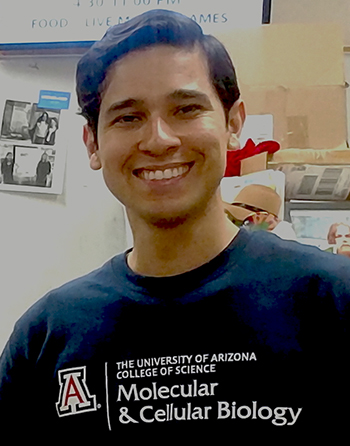 MCB’s Outstanding Graduate Student in Teaching for 2018, Johan Martinez-Fuentes, is inspiring students to have a “dendrite moment.”
MCB’s Outstanding Graduate Student in Teaching for 2018, Johan Martinez-Fuentes, is inspiring students to have a “dendrite moment.”
“In middle school, my science teacher used to call it a ‘dendrite moment’ whenever we made a connection and learned something new,” Martinez-Fuentes explains. That phrase has intrigued him ever since, helping to spark his love of science. How exactly does the brain form all of the proper connections—synapses—between nerve cells? This broad question has motivated him to teach and witness students forming their own new synapses as they learn—as well as to study the physical nature of “dendrite moments” themselves.
As a TA in Dr. Joyce Schroeder’s MCB 425: Cancer Discoveries course, Martinez-Fuentes has shown his aptitude for teaching.
“Johan really engages the students during the discussion periods and encourages them to think more broadly,” Schroeder observes. “He also requested to be able to teach a few lectures. This was a lot of extra work that he didn’t need to do, but he really wanted the opportunity to teach.”
Martinez-Fuentes’ smile conveys the satisfaction that teaching brings, “I don’t think I could have had a more focused experience in teaching. I got a lot of positive responses.”
He took advantage of the opportunity to design two lectures to bring his background in computational methods into the cancer biology course.
“Cells are like little computers,” Martinez-Fuentes explains. “I’m interested in studying, in precise and quantitative terms, how cells process many important signals from their environment. Systems biology is the young field where this problem lies.”
Combining biology with math and physics, Martinez-Fuentes is tackling a part of this puzzle by studying how neural precursors of the post-synapse, dendritic filopodia, have their “dendrite moment,” forming stable spine connections with their pre-synaptic partners.
Martinez-Fuentes suspects this process depends on mechanical forces. He is working in Dr. Charles Wolgemuth’s lab, at the intersection of physics and MCB, to further develop a model of actomyosin which reproduces microscopic observations where dendritic filopodia oscillate between outward growth/inward collapse before forming a stable connection, in order to incorporate factors like cell-cell adhesive resistance, and calcium dependent myosin activity. Using a computer model allows the lab to simulate filopodia behavior over a wide range of conditions.
“We know that physical forces are involved in the oscillatory motion,” Martinez-Fuentes explains, adding that in autism spectrum disorders these filopodia-derived spines, which are foundational to our cognitive abilities, are abnormal in their elongated shape and high numbers. "Shaping and maintaining proper spines is an extremely complex process, but stabilization is a very early step," he adds.
Martinez-Fuentes is passionate about his research, which combines his interest in basic science with a desire to show that biologists can do computational work. As a leader in UA SACNAS (Society for Advancement of Chicanos/Hispanics and Native Americans in Science), Martinez-Fuentes is eager to convey his message.
“I’d like to encourage students to see that not only can they be scientists, but there’s this field where biologists don’t just need to be good at biology—they can be great at combining biology with other fields,” he highlights. “I’m very committed to scientific engagement at the U of A and also in the larger community.”
Most recently, Martinez-Fuentes helped pair SACNAS with Pueblo High School biotechnology students entering the SARSEF (Southern Arizona Research, Science, and Engineering Foundation) Regional Science Fair. With fellow SACNAS volunteers, Martinez-Fuentes visited the school to engage students and provide support as they finished their science fair posters.
"I think it's really important that these young scientists know they have people cheering them on, especially during crunch time," Martinez-Fuentes enthuses. "I love being a resource for students. Back here, I was inspired by MCB Tea to start a SACNAS Tea Time. The idea is to make an informal space for students to safely and freely discuss relevant topics like dealing with difficult roommates, choosing a major, and other obstacles they face during college.”
Martinez-Fuentes has made important contributions to MCB, UA, and the Tucson community. He will be missed when he transitions to Boston University this summer as his wife, a fellow PhD student at Arizona State University studying family and human development, moves to Harvard with her PI to continue their work on how discrimination affects adolescent youth and influences their educational outcomes.
In turn, Martinez-Fuentes will miss the BMCB program, “I feel very cared for—I have people who open their doors for me when I need to talk. They care for my training and education.” He adds, “I’m constructively critiqued by professors—they’re so invested in my being part of the solution for future research and education.”
As interdisciplinary approaches to questions in biology become ever more central to new discoveries, Martinez-Fuentes is well-positioned to be a part of the answers in Tucson, Boston, and beyond.





